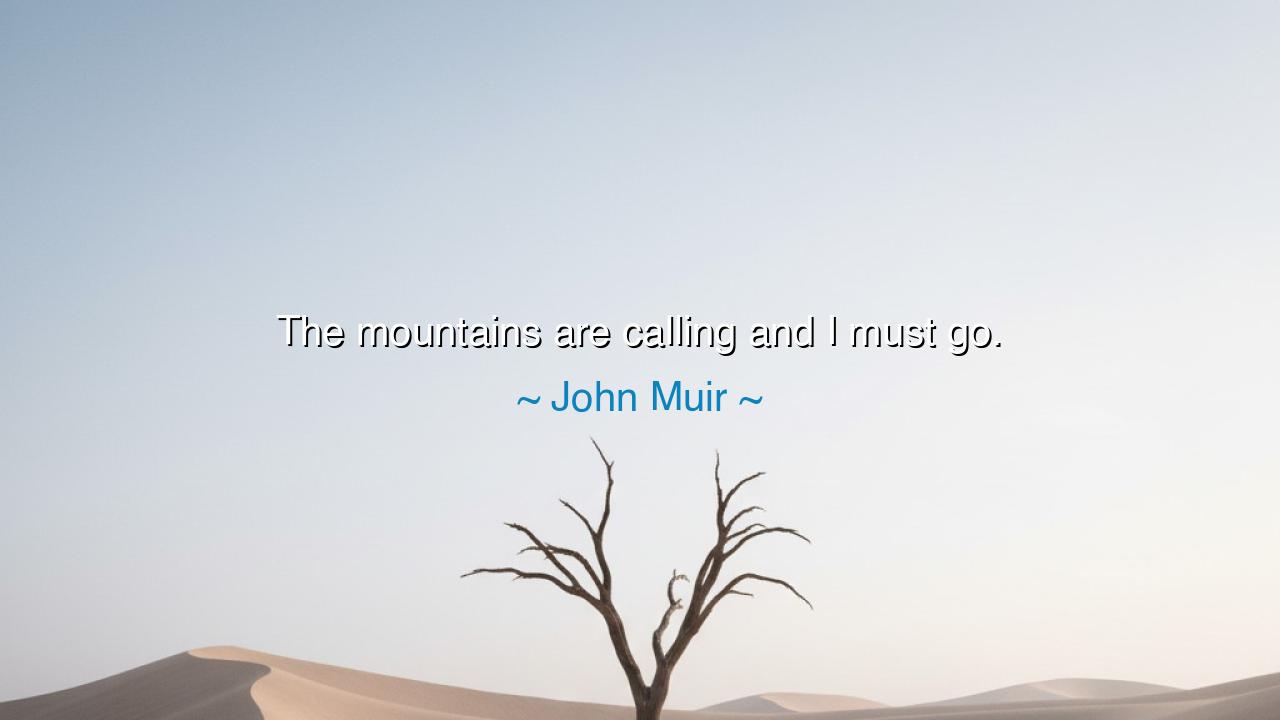
The mountains are calling and I must go.






John Muir, prophet of the wilderness and father of America’s national parks, once wrote with burning simplicity: “The mountains are calling and I must go.” These words, like a hymn rising from the heart, express the irresistible pull of wild places upon the human soul. In them lies not only his personal longing, but a truth as ancient as humanity itself: that we are drawn back again and again to the heights, where the air is pure, the silence vast, and the spirit made whole.
The origin of this phrase is found in Muir’s letters of 1873, when he lived among the Sierra Nevada in California. To him, the mountains were not inert stone but living temples, sanctuaries of divine presence. Their peaks and valleys spoke with a voice that none could silence. When he wrote, “I must go,” it was not duty nor command from men, but an answering to that eternal voice. For Muir, the wilderness was not an escape from life, but the very essence of it — a place where man could see God more clearly and hear his own soul more deeply.
History shows us many who heard the same call. Moses ascended Mount Sinai and returned with the law that would shape a people. The Buddha meditated in the shadow of the Himalayas until he found enlightenment. Even in myth, mountains are the dwelling places of gods — Olympus in Greece, Kailash in Tibet, Fuji in Japan. The high places have ever summoned humanity upward, not merely in body but in spirit, for to climb a mountain is to seek perspective, to rise above the dust and turmoil of the valley.
Muir himself embodied this spirit of ascent. He wandered alone in icy passes, slept beneath towering pines, and traced glaciers with a poet’s wonder and a scientist’s eye. His devotion to the mountains led to the preservation of Yosemite and countless wild spaces. Like a prophet of old, he preached that nature was not a resource to be consumed, but a sacred inheritance to be cherished. His simple words, “I must go,” were the beginning of a movement that saved great stretches of earth from destruction.
But his words also speak to the personal journey. Each of us has our own “mountains” — those places of challenge, beauty, or destiny that call us out of comfort. To ignore that call is to wither; to answer it is to live. Sometimes the mountain is literal, a wilderness awaiting our steps. At other times it is a dream, a task, or a calling that seems impossibly steep. And yet the heart whispers, “I must go,” for only in the climb do we discover who we are meant to be.
The lesson is clear: when the mountains call, do not hesitate. Whether they are the peaks of stone or the summits of the soul, heed them. Step away from the noise of the world, from the weariness of constant striving, and ascend to the places that give you life. There, in the silence and the grandeur, you will be renewed. Muir teaches us that the earth itself summons us to restoration, that to walk among the heights is to remember our smallness, our strength, and our belonging.
What must you do, then? Make time to go — into the wild, into the quiet, into the places that stir your spirit. Guard the sanctuaries of nature, for they are the wells of renewal not only for you but for generations to come. And when you hear the whisper of destiny, that inner voice that points you upward, do not delay. Say with Muir: “The mountains are calling and I must go.”
Thus, let his words endure not as mere poetry but as commandment. The world will tempt you to remain in the valleys of ease and distraction, but the mountains — whether of rock, faith, or dream — are waiting. And to ascend them is to find not only beauty, but yourself.






AAdministratorAdministrator
Welcome, honored guests. Please leave a comment, we will respond soon